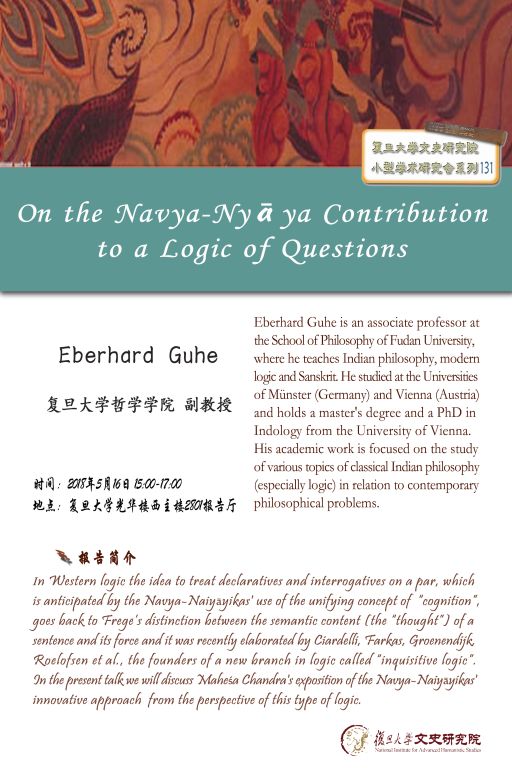
Lecture name:On the Navya-Nyāya Contribution to a Logic of Questions
Reporter:Eberhard Guhe , Associate Professor at the School of Philosophy of Fudan University
Time:15:00-17:00 ,May 16, 2018
Location:Room 2801, West Main Building, Guanghua Building, Fudan University
Abstract: In 1891 Maheśa Chandra published his Brief Notes on the Modern Nyāya System of Philosophy and its Technical Terms (BN), a primer on the terminology and doctrines of a branch in Indian philosophy called “Navya-Nyāya”. Despite its English title BN is a Sanskrit work. In the final section the author deals with “certitude” (niścaya) and “doubt” (saṃśaya) as the two varieties of “cognition” (jñāna). He illustrates the verbal expression of certitudes by means of declaratives and the verbal expression of doubts by means of interrogatives (functioning as polar or alternative questions). He notes also that different credence levels might be associated with the alternatives involved in a speaker’s doubt. A biassed question in the form of a tag interrogative might be an appropriate way to express such a doubt.
In Western logic the idea to treat declaratives and interrogatives on a par, which is anticipated by the Navya-Naiyāyikas' use of the unifying concept of “cognition”, goes back to Frege’s distinction between the semantic content (the “thought”) of a sentence and its force and it was recently elaborated by Ciardelli, Farkas, Groenendijk, Roelofsen et al., the founders of a new branch in logic called “inquisitive logic”. In the present talk we will discuss Maheśa Chandra's exposition of the Navya-Naiyāyikas' innovative approach from the perspective of this type of logic.
Personal Information: Eberhard Guhe is an associate professor at the School of Philosophy of Fudan University, where he teaches Indian philosophy, modern logic and Sanskrit. He studied at the Universities of Münster (Germany) and Vienna (Austria) and holds a master's degree and a PhD in Indology from the University of Vienna. His academic work is focused on the study of various topics of classical Indian philosophy (especially logic) in relation to contemporary philosophical problems.